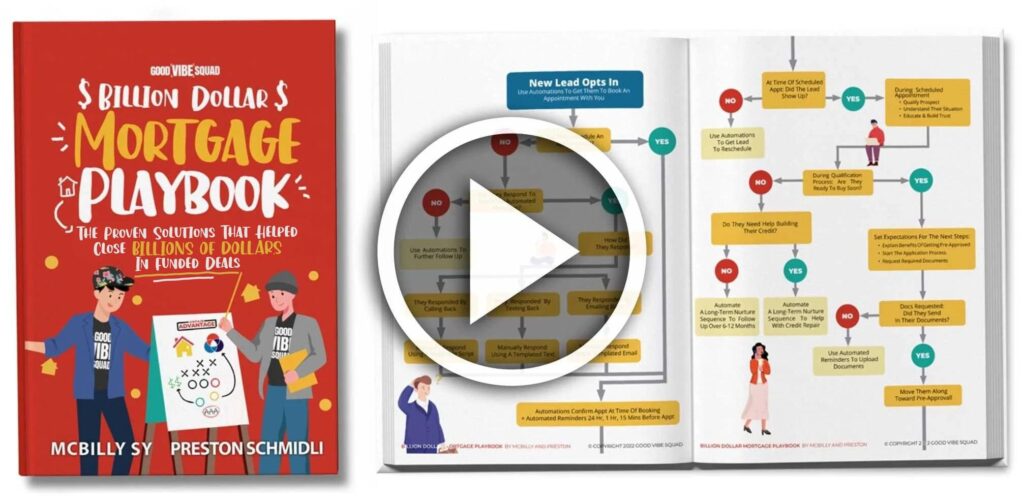Get Our Billion Dollar Mortgage Playbook
Get the proven strategies that helped close Billions of dollars in funded deals!
The headlines are filled with stories claiming ChatGPT and artificial intelligence will be replacing millions of jobs and changing life as we know it. Will loan officers be automated? Will loan officers be obsolete? This article puts the rumors to rest by addressing the things that can and cannot (or should and should not) be automated. It is highly unlikely that loan officers will be fully automated.
Key Takeaways
- Automations aren’t good or evil, they’re a tool.
- Like other fields, artificial intelligence may impact the mortgage industry, but that doesn’t mean LOs should worry about losing their jobs.
- Some things, like relationship-building, can never be truly automated so LOs should take solace in the fact that clients are looking for humans they can trust.
How artificial intelligence is changing the mortgage industry
Artificial intelligence is transforming the mortgage industry by automating routine tasks, reducing processing times, and improving customer experience. Loan officers no longer have to spend hours on manual data entry and document processing as AI can take care of these tasks for them. This allows loan officers to focus on more strategic and value-adding activities, such as building relationships with customers and providing personalized advice.
AI-powered chatbots are also being used to improve customer experience by providing instant responses to frequently asked questions and guiding customers through the mortgage application process. This not only saves time for customers but also reduces the workload for loan officers.
AI can analyze vast amounts of data to identify patterns and trends, which can help loan officers make more informed decisions. For example, AI can analyze credit scores, income, and other factors to determine the likelihood of a borrower defaulting on a loan. This can help loan officers make more accurate and objective decisions, reducing the risk of bad loans.
AI can also help mortgage lenders identify potential fraud by analyzing data and detecting anomalies. This can help prevent fraudulent activities such as identity theft, which can cause significant financial losses to lenders and borrowers.
Impact of Automation on Loan Officers
Efficiency and Accuracy
Loan origination is a complex and time-consuming process. However, automation can significantly reduce the time needed to complete the process. Loan officers can use automation tools to process applications, verify data, and generate reports in a fraction of the time it would take to do it manually. Automated loan origination systems can also ensure that data is accurate and consistent throughout the process, reducing the risk of errors and omissions.
Moreover, automation can streamline the loan origination process by integrating disparate systems, providing reliable and consistent data flow, and delivering solid audit and control benefits. Automated workflows can also alert customers and mortgage lending institutions of errors and omissions in the process while they can still be addressed.
Job Security and Employment Outlook
As automation technology continues to advance, there is a growing concern among loan officers that their jobs may become obsolete. While it is true that automation can replace some of the tasks traditionally performed by loan officers, it is unlikely that it will eliminate the need for human expertise altogether.
Loan officers who are willing to adapt to the changing landscape and embrace automation tools will likely have an advantage over those who resist change. By leveraging automation technology, loan officers can become more efficient and productive, allowing them to focus on more complex tasks that require human expertise.
In terms of employment outlook, the Bureau of Labor Statistics projects that employment of loan officers to increase by 4% from 2021-2031, indicating that there’s plenty of opportunity for those who seek it. This amounts to thousands of new jobs opening likely to replace those exiting the field or retiring.
Overall, the impact of automation on loan officers is complex and multifaceted. While automation can improve efficiency and accuracy, it also raises concerns about job security and employment outlook. Loan officers who are willing to embrace automation technology and adapt to the changing landscape will likely have an advantage over those who resist change.
Potential Challenges and Limitations of Automations
Complex Decision Making
Loan origination involves complex decision-making processes, which require human judgment and expertise. Although automation can streamline the loan origination process, it may not be able to replace the nuanced decision-making abilities of experienced loan officers. Automation can only make decisions based on the data fed into it, which may not always be comprehensive or accurate.
Moreover, the lending industry is constantly evolving, and new regulations and market trends can impact lending decisions. As a result, it is essential to have experienced loan officers who can adapt to changing circumstances and make informed decisions that balance risk and reward.
Customer Service
Loan origination is not just about crunching numbers and approving loans. It is also about providing exceptional customer service and building relationships with clients. Loan officers often act as trusted advisors, guiding clients through the loan origination process and providing personalized solutions that meet their unique needs.
While automation can speed up the loan origination process, it may not be able to provide the same level of customer service that human loan officers can. Automated systems may not be able to answer complex questions or provide personalized solutions that take into account a client’s unique financial situation and goals.
Relationship Building
Building relationships is a critical aspect of loan origination. Loan officers need to understand their clients’ financial goals, risk tolerance, and personal preferences to provide personalized solutions that meet their needs.
Automation may not be able to replace the human touch that loan officers bring to the table. Automated systems may not be able to establish trust with clients or build long-term relationships that are essential for repeat business.
Besides, consumers have stated they do not want the loan process to be fully automated. The 2022 Borrower Insights Survey found that nearly 1/4 of borrowers who applied for a mortgage between 2020-2022 and nearly 1/3 of borrowers who applied within the past three or more years said that they would prefer a more traditional lending process rather than using a completely digital system.
In conclusion, while automation can improve the loan origination process, it may not be able to replace the nuanced decision-making abilities, exceptional customer service, and relationship-building skills of experienced loan officers. As a result, it is essential to strike a balance between automation and human expertise to ensure that clients receive the best possible service and solutions.
The Verdict
In conclusion, while the use of automation and AI in the loan origination process is increasing, it is unlikely that loan officers will be entirely replaced by machines. Instead, loan officers will need to adapt and leverage technology to improve their efficiency and effectiveness in their role.
One of the key benefits of AI and automation in the loan origination process is the ability to streamline disparate systems and provide reliable and consistent data flow. Additionally, AI can provide loan officers with valuable insights into customer behavior and preferences, allowing them to tailor their approach to better meet the needs of their clients.
However, it is important to note that technology cannot replace the human element in the loan origination process. Building relationships with clients, understanding their unique circumstances, and providing personalized advice and guidance is still a critical part of the loan officer’s role. While technology can assist with many aspects of the loan origination process, it cannot replace the value of a human touch.
Overall, the future of the loan officer is one in which technology and human expertise work together to provide the best possible service to clients. By embracing new technologies and finding ways to leverage them to improve their work, loan officers can remain competitive and effective in their field.
Learn More About Our Award-Winning Hybrid Automation System for Loan Officers
Good Vibe Squad’s proven system isn’t made to replace you, it helps you be more efficient and elevate your skills to close and fund more loans without sacrificing the human element. There are companies out there that automate 100% of the lead gen and closing process, and this article explains why we DON’T recommend that. Besides, we’ve got a thriving community of hundreds of LOs ready to cheer you on in “co-petition” versus “competition.”
Schedule a call with our team today!




